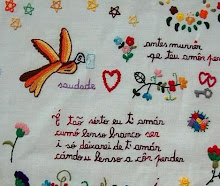segunda-feira, fevereiro 18
Carlos do Carmo wins Goya Award
Monk Rider: the journey through the Self
"From the valley to the mountain, From the mountain to the hill, Horse of shadow, monk rider. Through houses, through meadows, Through gardens, through fountains, In alliance you walk. From the valley to the mountain, From the mountain to the hill, Horse of shadow, monk rider. Through black cliffs, Behind and ahead, In secrecy you walk. From the valley to the mountain, From the mountain to the hill, Horse of shadow, monk rider. Through desert meadows, Without horizons, In freedom you walk.
From the valley to the mountain, From the mountain to the hill, Horse of shadow, monk rider. Through trackless ways, Through rivers without bridges, In solitude you walk. From the valley to the mountain, From the mountain to the hill, Horse of shadow, monk rider. For it is endless And accounted by no one, In me you walk. Through black cliffs, Through rivers without bridges, In me you walk."
This is the journey of self discovery. “Know yourself, defy your limits” was Socrates motto meaning with this that if you want to value the light, the perfection you first have to go deeper, and experience the darkness.
For this video, Mariza (of course, who else?) chose for scenario the “Quinta da Regaleira” in Sintra* one of the most mystical places of
*The name “Sintra” has its origin in the word “Cynthia“, symbol of the moon in the celtic mythology. The Romans called it “Mons Lunae“, meaning “the hill of the moon“, and there were deeds sacrifices in its honour. This mystical stigma has been maintained until our times.
Sintra is a romantic getaway for people from all around the world, and has always been a place of election by kings and nobles as a country resort, and praised by writers and poets.












